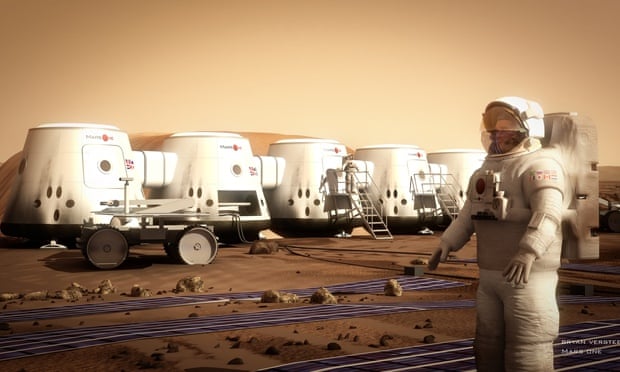Gerard ’t Hooft, Dutch Nobel laureate and ambassador for project, says he does not believe mission can begin in 2024 as planned
Hannah Devlin, science correspondent
Tuesday 24 February 2015 02.00 AEDT Last modified on Tuesday 24 February 2015 03.19 AEDT
The budget and timeline for
plans by a Dutch organisation to colonise Mars are highly unrealistic, one of the project’s most eminent supporters has suggested.
Gerard ’t Hooft, a Dutch Nobel laureate and ambassador for Mars One, said he did not believe the mission could take off by 2024 as planned.
“It will take quite a bit longer and be quite a bit more expensive. When they first asked me to be involved I told them ‘you have to put a zero after everything’,” he said, implying that a launch date 100 years from now with a budget of tens of billions of dollars would be an achievable goal. But, ’t Hooft added, “People don’t want something 100 years from now.”
Last week the organisation announced its shortlist of 100 applicants,
including five British hopefuls, to be the first members of a permanent human colony on the red planet.
According to the Mars One’s official timeline, a stationary lander and satellite will be sent to Mars in 2018, followed by a rover in 2020 and cargo missions starting in 2022. Humans would start arriving in 2025, and crews of four would be sent every two years to add to the settlement.
Bas Lansdorp, the founder of Mars One, remains upbeat about the prospects of the mission, which he is hoping to fund by selling rights to film it for a reality television series to be made by Endemol, the Dutch producer of Big Brother. “Don’t forget that when Kennedy announced the Moon mission he had less time,” Lansdorp, who has a background in mechanical engineering, told the Guardian.
Scientists, though, have remained doubtful that the mission will get beyond the hypothetical stage, citing its lack of funding and the lack of a spacecraft or habitat suitable for supporting life on a long-term mission.
A recent analysis by a team at the Massachusetts Institute of Technology (MIT) identified crucial flaws with Mars One’s published plans and predicted that even if the astronauts got to the surface unscathed, the first person would suffocate within 68 days because of a lack of equipment to balance oxygen levels effectively.
T’Hooft, of Utrecht University, said he was concerned by the findings. “I understand the scepticism very well. People from outside will say ‘wait a minute, you have to be careful with what you’re doing and what you’re claiming’. Maybe there’s a need to reassess,” he said.
He added that the “proper thing” would be for
Mars One to publish its own analysis to demonstrate that their own more favourable projections about life on the Red Planet were sound.
Despite being sceptical about the details, t’Hooft said he still supported the project’s overall goals. “Let them be optimistic and see how far they get,” he said.
Sydney Do, a graduate student at MIT and part of a team who tested the feasibility of the proposals, said they quickly realised that many of the technologies that were integral to the plan were not available or even under development. “There’s no deep-space habitat in development, there’s no lander in development,” he said.
The calculations highlight the complexity of simply trying to balance the gas levels inside the inflatable capsule in which the astronauts would reside. The amount of CO2 exhaled by the astronauts is not enough to keep the plants alive and if you manage to pump in enough CO2 from the outside, the amount of O2 produced by the crops is too great, creating a fire risk.
The first astronaut would suffocate within 68 days, in the absence of a new machine capable of selectively pumping oxygen out of an environment,
the MIT study suggests. The assessment also estimated that an area of about 200 square metres would be needed to grow food to support four people, compared with the 50square metres that Mars One estimates would be needed to feed 12 astronauts.
Do said that Mars One representatives had treated the findings with a “mix of defensiveness and condescension”. “They haven’t provided any concrete dispute with the findings,” he said. “They’re not being as transparent as they should be, especially when human life is at risk here.”
Lansdorp said the MIT analysis had included “preposterous decisions” on the design of the simulation, which had led to incorrect conclusions. He said these would be challenged by a new assessment by
Paragon Space Corporation, commissioned by Mars One. “They’ve been wrapping up their own study, which will be out in early March. They called the MIT analysis ‘very naive’,” he said.
There was potential for delays to the timeline, said Lansdorp, but added that he believed a 2024 launch was achievable in theory. “When we had to put back the launch date from 2023 to 2024, my co-founder said ‘great, our first delay. We’re starting to look like a real space mission’.”







 @ this being a scam
@ this being a scam